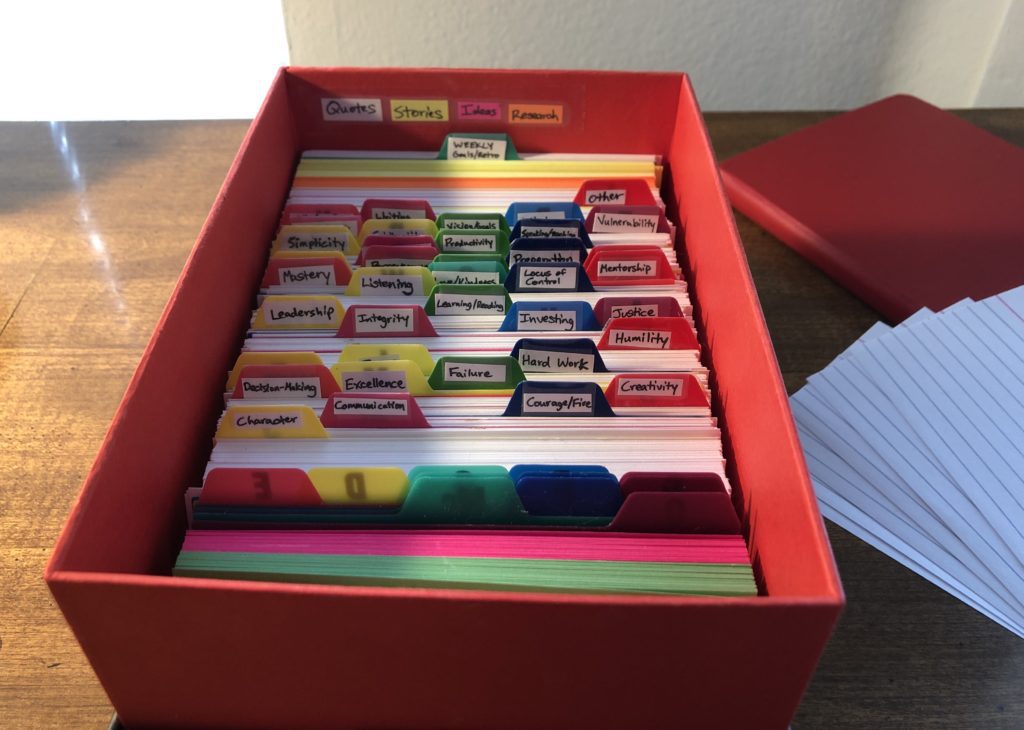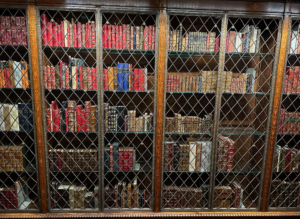How To Create a Commonplace Book
The phrase “life hacks” is overused. Just like me, you’re probably sick of writers weaponizing that phrase as clickbait. Regardless, I think there’s something to be said for learning tactics that have been useful for others.
The best writing hack I’ve learned is something called “commonplacing.”
If you’re unfamiliar with the concept, I’ll give you an overview of what you need to know. If you’re already familiar with commonplacing, we can compare notes on what tactics have been most helpful.
What Is Commonplacing?
Effectively, commonplacing is the act of compiling knowledge for future reference. Countless people throughout history have created commonplace books to catalog the knowledge they’ve learned from life experience, books, mentors, and peers.
While many people use a physical book for this practice, any cataloging system can serve the same purpose: 3x5 cards, Evernote, etc.
“Scholars, amateur scientists, aspiring men of letters — just about anyone with intellectual ambition in the seventeenth and eighteenth centuries was likely to keep a commonplace book. In its most customary form, ‘commonplacing,’ as it was called, involved transcribing interesting or inspirational passages from one’s reading, assembling a personalized encyclopedia of quotations.” -Steven Johnson
Who Has Used Commonplacing in the Past?
Many people throughout history have used commonplace books. The practice was widespread in the Middle Ages and the Renaissance, and some savvy writers still use commonplacing today.
Marcus Aurelius (121–180 AD) kept a commonplace book that was effectively turned into the book Meditations, a core text of Stoic philosophy.
Erasmus (1466–1536) is known as the father of modern commonplacing, popularizing the concept in his book De Copia in 1512. He subdivided his book into categories of virtues and vices, like piety and fidelity.
John Locke (1632–1704) wrote an entire book about the practice: A New Method of Making Common-Place-Books. According to author Nicholas Basbanes, “Locke gave specific advice on how to arrange material by subject and category, using such key topics as love, politics, or religion. Commonplace books, it must be stressed, are not journals, which are chronological and introspective.”
Thomas Jefferson (1743–1826) kept two separate commonplace books: one for legal notes and another for literary ones. He recorded entries in English, Latin, and Greek, primarily noting favorite quotes from books he read.
E.M. Forster (1879–1970) used his commonplace book to record quotes, comments on what he was reading at the time, interesting tidbits he overheard in others’ conversations, and ideas for future novels.
Ronald Reagan (1911–2004) used a notecard system to record stories and jokes to use in speeches. “He had all this stuff he had stored up all these years — all these stories, all these anecdotes,” said Reagan’s speechwriter Ken Khachigan. “He had the Reagan library in his own little file system.”
Ryan Holiday, author of bestsellers like Ego Is The Enemy and Perennial Seller, is a famous modern proponent of commonplacing and has written about his process in past blog posts.
Steven Johnson has written 11 books across a wide variety of topics, including psychology, science, technology, and decision-making. Last year I had the chance to meet Johnson and hear him speak. Malcolm Gladwell interviewed Johnson for the event and asked Johnson how he’s managed to write nearly a dozen books in the past two decades. Johnson credited his prolific writing to journaling and commonplacing, saying that he records random notes and musings in a 100,000-word Google Doc.

How Can You Create a Commonplace Book?
I adapted my commonplace book (pictured below) from a system used by Ryan Holiday, who adapted his from bestselling author Robert Greene.
I’ve opted to use 3x5 notecards as my commonplacing system. They’re simple, cheap, and easy to categorize into topics.

For my commonplace book, I color-code quotes, stories, ideas, and research data onto different colors of 3x5 cards for easy reference.
The entire setup for my commonplace book cost me about $20. I bought a few packages of 3x5 cards and two batches of index card dividers, then turned an old Beats by Dre headphones box into my storage container.
I label each card with a category (like “Hard Work” or “Writing”), then sort the cards by category with 3x5 notecard dividers.
For example, I recently read Anne Lamott’s handy writing guide Bird by Bird. Her book contains this gem that I wanted to remember for the future:
“You don’t care about those first three pages; those you will throw out, those you needed to write to get to that fourth page, to get to that one long paragraph thatwas what you had in mind when you started, only you didn’t know that, couldn’t know that, until you got to it.” -Anne Lamott
After stumbling across this quote, I wrote it on a white 3x5 card (I use plain white cards for quotes) and labeled it with the category “Writing.”
I later used that quote in a story about inspiring writing advice: 10 Quotes That Will Put Your Butt In Gear To Start Writing.
Why Should You Care About Commonplacing?
Archiving memorable quotes and stories not only helps me remember what I read, but it also helps me write.
Rather than poring through marginalia in old books to find useful quotes, I have my primary notes about a topic in a common place. While writing the story referenced above, I was able to shuffle through the stack of 3x5 notecards in my “Writing” category to find the best ones to highlight for the story. This process eliminated hours of research and helped me write the story in a single day.
As another example, last month I published a story about the writing lessons I’ve learned this year. My commonplace book provided much of the material for that article too, which probably cut my writing time in half.
As writers, we’re all looking for ways to increase the quality and quantity of our writing. Commonplacing has helped me improve both.
It has given me a way to collect quotes and story ideas as I stumble across them rather than having to wrack my brain later to think of applicable ideas.
Creating a commonplace book has revolutionized my writing process, and I bet it will help you too. Give it a shot and let me know how it goes!




